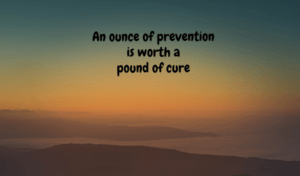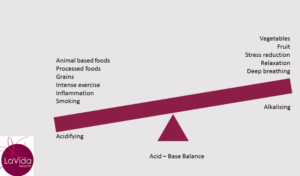“Who has time for breakfast? If I skip itI might gain an extra 10 or 15 minutes in the mornings. I could use that to sleep in or perhaps I would have more time for work. It would be so much easier to bypass that step in my morning routine and just grab a coffee and muffin/donut/ pastry/raisin bread for morning tea.”
Have you ever had those thoughts? I’m not sure when I started thinking like that (probably sometime in my twenties when I was caught up in the corporate grind) but it stuck with me for many years. Even my cancer diagnosis wasn’t enough of a wake-up call! In reality, I think the penny didn’t drop until I began studying my naturopathy degree and started understanding more about human biochemistry and the science behind why nourishing food is important for our health.
Fortunately for me, the penny did drop and now I seriously couldn’t contemplate starting the day without breakfast. And when I see clients who regularly skip the first meal of the day I am concerned for them. So, if you are a breakfast-skipper, I want you to consider whether that is serving you well. How is your energy during the day? What about your weight? Or your mood or concentration?
Coffee and raisin toast are not a healthy breakfast!
The health benefits of eating a good breakfast
- It is literally breaking the fast which has lasted since you last ate the prior evening (which hopefully wasn’t just before you went to bed). Overnight, your energy stores have been depleted and you need to restock them before starting your day. It’s like making sure the car is full of petrol and topping up the oil and water before heading out on a long trip.
- Skipping breakfast will generally result in a drop in your morning blood sugar levels which will see you reaching for the sugary foods or refined carbohydrates as your brain signals the need for emergency refuelling in order to keep going. This is not good for sustained energy or long term health.
- If you are interested in achieving and maintaining a healthy weight you need to eat breakfast. It’s like putting fuel on the fire that is your metabolism and cranking it up for the day. Skipping breakfast (or any meal for that matter) suggests to your brain that food is scarce and therefore your innate metabolism slows down to conserve energy in the absence of food.
- A good breakfast is an excellent way to ensure your blood sugar levels don’t take you on a roller coaster ride as they fluctuate during the day causing you to react with more grabs for sugary foods and quick afternoon pick-me-ups.
- Studies have shown that people who eat a good breakfast are likely to consume less calories overall during the day.
- We also know that making a decision in favour of your health (such as having a healthy breakfast) at the start of the day sets you up for making more healthy choices through the rest of the day. Whereas when we start poorly the risk is that we will carry on that way. It becomes a vicious cycle that is hard to break.
- Those who eat breakfast have been shown to have better cognition and memory for their tasks throughout the day, not to mention a better mood. (This has been extensively studied in school children but it applies to adults too).
- Fuel means energy. If you want to feel more energetic you need to give your body the fuel it needs (not just in calories but in vitamins and minerals too).
- Do it for your kids and be a role-model you can be proud of but more importantly do it for yourself. You owe it to yourself to take care of your body.
A note on intermittent fasting
The popularity of intermittent fasting has gathered pace in the last few years. Simply put, it’s where you go without food for a period of time (usually 12-16 hours but there are other variations). It might be every day or for a number of days a week. Most commonly, people who do intermittent fasting tend to find breakfast the easiest meal to skip.
Intermittent fasting has been shown to be beneficial for weight loss and longevity in certain individuals but it’s not necessarily good for everyone so please don’t adopt intermittent fasting without the guidance of an appropriately qualified health professional. Your overall health needs to be taken into consideration along with the outcomes you are trying to achieve.
What if I’m not hungry?
There can be a number of reasons why you might not have an appetite in the morning including having eaten too much or too late the night before. For some tips around appetite, check out my blog “the importance of a good appetite and how to improve it”.
So, have I convinced you? Why not try having breakfast every day for a couple of weeks and see if you notice a difference. Need some breakfast inspiration? Check out my blog…quick and easy nutritious breakfasts.





